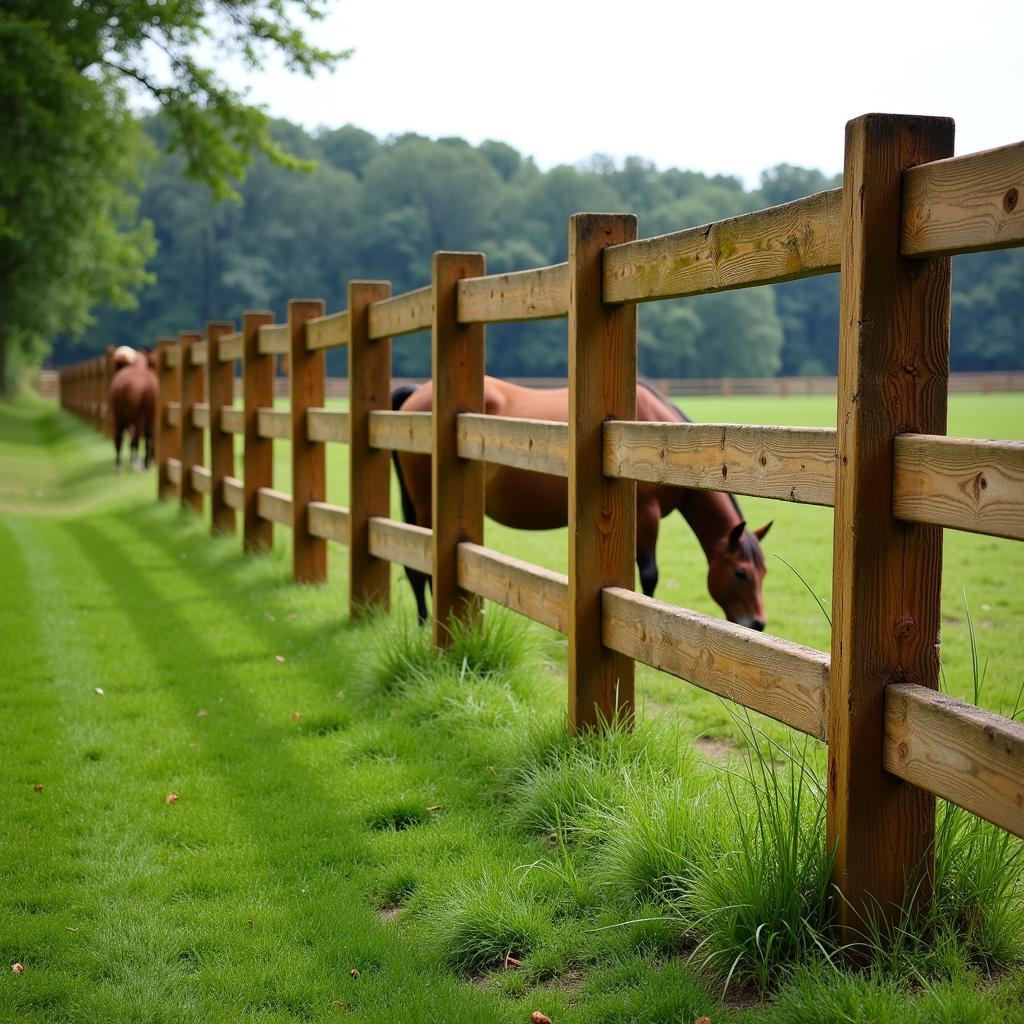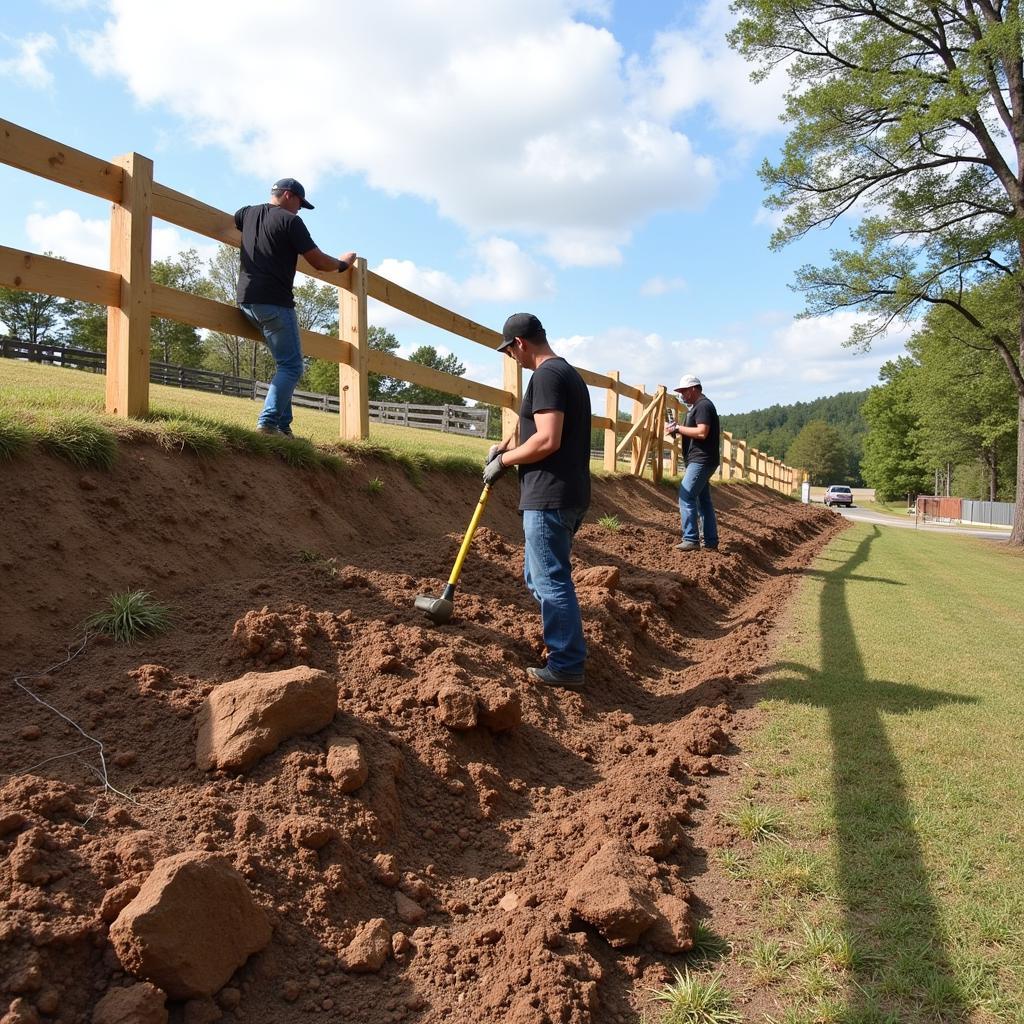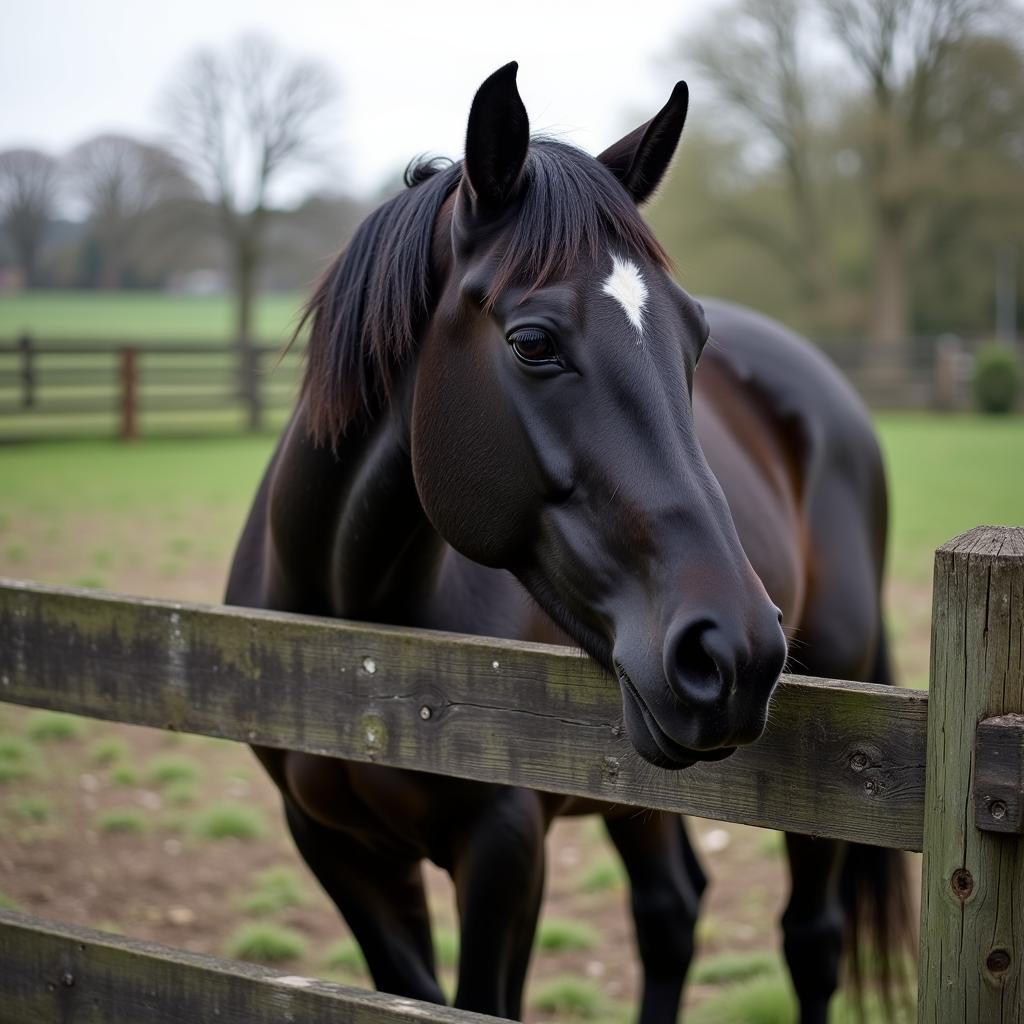When establishing a safe and secure haven for your horses, few things are as crucial as reliable fencing. But amidst the excitement of designing your dream pasture, the question arises: “How much does Horse Fence Cost?”. It’s a valid concern, as horse fencing involves a considerable investment, and understanding the factors influencing the final price is essential for effective planning. This comprehensive guide will delve into the world of horse fence costs, covering everything from materials and installation to hidden expenses and budget-friendly tips.
 Wooden fence for horses
Wooden fence for horses
Factors Influencing Horse Fence Cost
Determining the exact cost of a horse fence isn’t as simple as picking a number out of a hat. Several factors interplay to determine the final price tag, each demanding careful consideration.
1. Fencing Material: The Heart of the Matter
The type of fencing material you choose plays the most significant role in determining the overall cost. Let’s explore the most common options:
-
Wood Fencing: Inexpensive horse fence options often utilize wood. It offers a traditional aesthetic and is relatively affordable upfront, ranging from $10 to $30 per linear foot installed. However, wood requires regular maintenance and is susceptible to weathering and damage.
-
Vinyl Fencing: While pricier upfront, ranging from $20 to $50 per linear foot installed, vinyl fencing offers unparalleled longevity and minimal upkeep. Its resistance to weathering, rotting, and fading makes it a popular choice despite the higher initial investment.
-
Metal Fencing: For robust security and durability, metal fencing takes the lead. Options like steel and aluminum offer exceptional strength and can withstand harsh weather conditions. However, this resilience comes at a cost, with prices ranging from $30 to $70 per linear foot installed. Metal horse fence panels offer a good balance between durability and cost-effectiveness.
-
Mesh Fencing: When visibility and airflow are paramount, mesh fencing, typically made from woven wire, is a suitable choice. It’s relatively affordable, ranging from $15 to $35 per linear foot installed, but may require additional reinforcement for horses prone to leaning or pushing.
2. Fence Height: Keeping Your Horses Secure
The height of your horse fence directly impacts the amount of material needed, influencing the overall cost. While a standard height of 4 to 5 feet suffices for most horses, those known for jumping or challenging boundaries might necessitate a taller fence, increasing material costs.
3. Property Size and Shape: The Lay of the Land
Larger properties naturally require more fencing materials, significantly impacting the overall project cost. Similarly, irregularly shaped properties, those with slopes or curves, might demand more materials and labor for installation, further influencing the final price.
 Installing a horse fence on a sloped terrain
Installing a horse fence on a sloped terrain
4. Gate Installation: Ensuring Accessibility
Gates provide essential access points to your pasture, but they also contribute to the overall fencing cost. The number and size of gates required, along with the chosen material and any automated features, will influence the final expenses. Horse gates are specifically designed to accommodate the size and movement of horses and are essential for a safe and functional pasture.
5. Labor Costs: The Price of Expertise
While DIY installation can save money, hiring experienced professionals ensures proper fence construction and minimizes the risk of costly mistakes. Labor costs vary depending on location, project complexity, and the chosen contractor.
6. Additional Features: Enhancing Safety and Functionality
Adding features like electric tape, top boards, or no-climb fencing can enhance your fence’s safety and effectiveness. However, these enhancements come at an additional cost.
Budgeting for Your Horse Fence: Tips and Considerations
Navigating the world of horse fence costs doesn’t have to be daunting. Armed with the right information and planning, you can establish a budget that meets both your horses’ needs and your financial constraints.
- Prioritize Safety and Functionality: While budget constraints are a reality, prioritize the safety and well-being of your horses above all else. Opt for durable materials and appropriate heights, even if it means adjusting your budget or phasing the project over time.
- Request Multiple Quotes: Contact several reputable fencing contractors in your area to obtain detailed quotes. This allows you to compare pricing, services offered, and choose the best fit for your needs.
- Consider DIY Options: If you’re handy and have the time, tackling certain aspects of the installation yourself, such as preparing the site or painting the fence, can potentially save on labor costs.
- Explore Financing Options: Several financing options, such as loans or payment plans, are available for larger fencing projects. Research different options to determine the best fit for your financial situation.
Frequently Asked Questions: Addressing Common Concerns
1. What is the most affordable type of horse fence?
While wood fencing offers the lowest upfront cost, its maintenance requirements might offset the initial savings over time. Mesh fencing provides a budget-friendly option while still ensuring adequate containment for most horses.
2. How long does a horse fence typically last?
The lifespan of a horse fence depends on various factors, including material quality, installation, and maintenance. Well-maintained vinyl or metal fencing can last for decades, while wooden fencing might require replacement after 10-15 years.
3. Can I install a horse fence myself?
While DIY installation is possible, it requires significant time, effort, and a good understanding of fence construction techniques. Hiring professionals ensures a properly installed and safe fence for your equine companions.
 Black horse standing calmly near a sturdy fence
Black horse standing calmly near a sturdy fence
4. What are some hidden costs associated with horse fencing?
Hidden costs might include permit fees, site preparation expenses, unexpected terrain challenges, or the need for additional materials like gravel or concrete for gate posts.
5. How often should I inspect my horse fence?
Regular fence inspections are crucial for identifying and addressing potential hazards promptly. Aim to inspect your fence at least once a week, and more frequently after storms or extreme weather events.
Conclusion: Investing in Your Horses’ Well-being
Determining the cost of a horse fence is a multifaceted process influenced by various factors. By carefully considering your budget, your horses’ needs, and the available options, you can make informed decisions that prioritize safety, functionality, and longevity. Remember, a well-built and maintained fence is a worthwhile investment in your horses’ well-being and your peace of mind.
If you need help finding the perfect property for your horses, including assessing fencing needs, check out our listings for rental horse property or horses for sale NC. Our team at Justus Horses USA is dedicated to supporting your equine endeavors every step of the way.
For personalized guidance and support in finding the perfect fencing solution for your equine companions, reach out to our team of experts. Contact us at Phone Number: 0772127271, Email: [email protected] or visit us at QGM2+WX2, Vị Trung, Vị Thuỷ, Hậu Giang, Việt Nam. Our dedicated customer support team is available 24/7 to assist you.